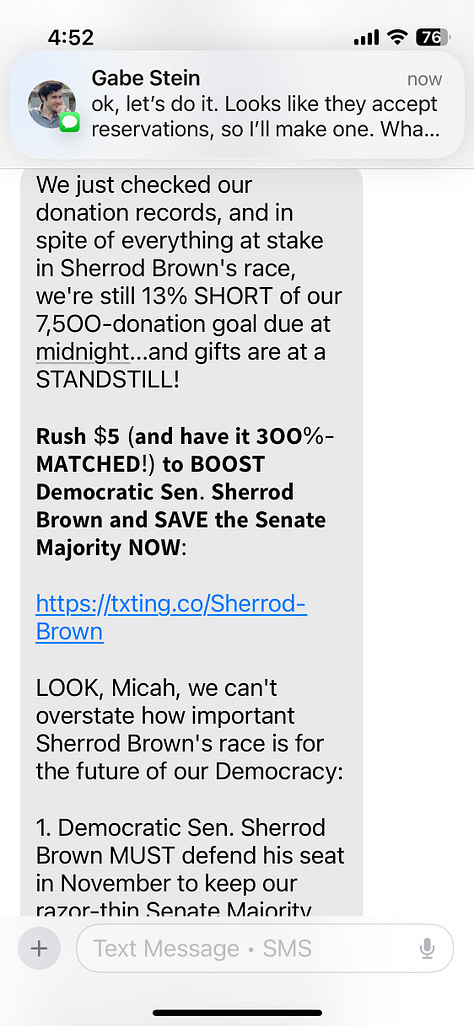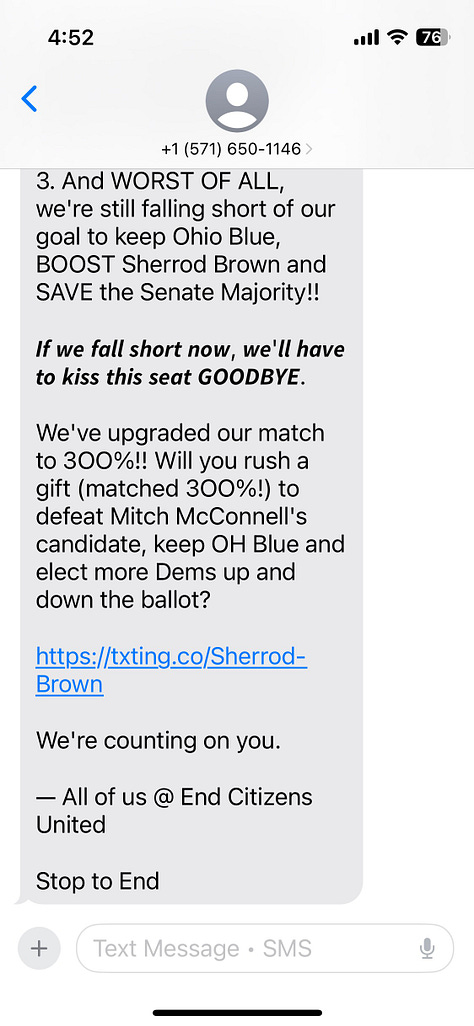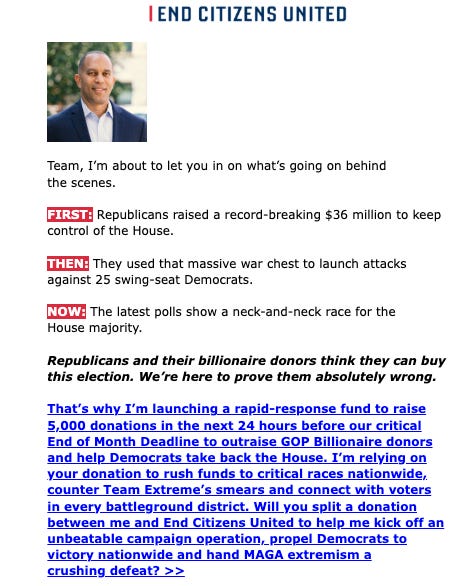🔥 BREAKING: Only a $5 Gift Can Stop the Lies About Mothership!
The defenders of spam-and-scam, churn-and-burn fundraising are proud of what they do! And they are pushing back. Which means we're at a tipping point. ACT NOW!
When you step back and consider how much our country’s current leaders not only defend scamming the public--promoting the spread of crypto-currency and other shady investments even into 401k retirement funds that are supposed to be cautious; dismantling the Consumer Financial Protection Bureau and letting corporate offenders off the hook, undermining the reliability of economic data collected by the Bureau of Labor Statistics—it may seem small and churlish to spend valuable time and attention on how Democrats and their allied groups also scam the public with their fundraising appeals.
But how we fund how we fight back matters for multiple reasons. First, I think we can all agree that fundraising appeals need to be honest and ethical. While it’s true that you might be able to raise a ton of money by, say, kidnapping the pets of public officials and holding them for ransom, no one would suggest that the ends (“we need enough money to match what the Republicans are spending against us”) might justify the means (“give us a million dollars or the dog dies”). Mining bitcoin is also a way to mint money--should the DNC fire up some shuttered coal plants to fund itself?
Second, because lying to people about non-existent matching funds, or claiming that such-and-such politician or celebrity is ASKING RIGHT NOW! when they have nothing to do with the organization asking, or promising impossible results like THIS BILL COULD CHANGE EVERYTHING!, or making up fake deadlines BUT ONLY IF YOU GIVE BEFORE 11:59PM, or asking people to sign petitions that are never printed and delivered—all of this contributes to increasing cynicism and alienation. And especially among the very people who, by virtue of having at least once chosen to support a candidate or cause for positive reasons, now find themselves bombarded by shrill and unwanted demands for money. Every one of those people ought to be valued, not just the small percentage who give in response to spammy and scammy appeals.
Finally, how we raise money affects how we campaign and organize. And yes, while it is good to build a large base of small-donors rather than be dependent on a wealthy few, the extractive model of churn-and-burn, spam-and-scam is propping up a broken playbook. As David Donnelly and Doran Schrantz wrote a few months ago, which I’ll requote:
“Since the mid-2000s, Democrats and allied organizations, encouraged by political donors, have developed a top-down approach to voter mobilization that relies heavily on two things: 1) narrow, data-driven targeting based almost entirely on voting history, and 2) the use of randomized control trials to determine voter engagement tactics and get-out-the-vote messaging. When the findings are significant, campaigns apply the method in the next congressional or presidential election in contacting those voters who are relatively likely to vote. In the abstract, this makes sense.
In reality, these practices contribute to an impersonal marketing approach that builds no sense of community, replaces authentic two-way conversations with tightly scripted, check-a-box interactions, and assails people with a blitzkrieg of annoying text messages. It is an approach that values the cost-efficiency of a "tactic" above all else, rather than focusing on any substantive impact. And it constrains volunteers and paid staff—our most important human assets—to scripted, time-limited conversations with only those voters who will likely vote and will predictably vote for Democrats, rather than giving them the freedom to have real conversations with persuadable or would-be voters. In this paradigm, only some voters are worthy of attention, while tens of millions potential voters are not. We end up prioritizing transactional, one-off contacts, not relationships and networks.”
The noise these opportunistic PACs generate also hurts the larger advocacy field by confusing would-be donors who want to help a cause but don’t know who is actually doing real work. As Craig Aaron, the longtime leader of Free Press, an excellent media reform group, noted last week, “I'll emphasize how harmful these grifters are to nonprofits who get drowned out by their noise. I get multiple texts from the same folks talking about public media cuts -- when they did zero to try to stop those cuts. Same for any ‘hot’ issue.”
Last week, Stanford political scientist Adam Bonica set off a small but real firestorm across the Democratic ecosystem with his Substack post charging Mothership Strategies with “extracting $282 million from a network of spam PACs while delivering just $11 million to actual campaigns.” It looks like he made some errors in his analysis of the FEC data, which I’ll get to in a moment, but his piece wouldn’t have circulated so widely if it hadn’t struck a real nerve. This line, which I didn’t quote in my post about all this last week, in particular, was designed to resonate:
“For every dollar a grandmother in Iowa donates believing she's saving democracy, 98 cents goes to consultants and operational costs. Just pennies reach actual campaigns.”
Ouch!
Now Mothership Strategies, which generally avoids talking to the press, has responded with a post on Medium defending its work. It boasts about raising “more than $1.1 billion for Democratic candidates and causes” over the past decade, helping numerous organizations advance their issues, and working in close alliance with Democratic leadership, “every major Democratic House caucus,” and lots of Democratic Super PACs and leadership PACs.
Mothership says that Bonica’s estimate of just 1.6% of every dollar raised ($11 million out of $678 million across the whole network of PACs that have paid it for services over the last decade) going to candidates and party committees leaves out other things PACs spend on, like training programs, field organizers, digital ad campaigns, independent expenditures, voter registration and GOTV programs—though it doesn’t offer any detail to back this up.
Bonica has since posted an update, and said regarding that 1.6% figure that “there are additional expenditures which could be legitimate. But I don’t know. So I only reported what I could verify via the data in FEC filings. A very generous interpretation might put the efficiency rate at 10-20% (still terrible). However, when PACs build their model on deception, it’s their job to prove their spending serves a legitimate purpose, not mine to assume it does.”
Mothership also insists that most of the $159 million that it has received in consulting fees from client PACs—one of Bonica’s harshest findings—has not settled in its pockets but instead represents “pass-through” expenses that it pays to other vendors for things like Facebook and Google ads, email and text-messaging platforms, and list acquisition. Bonica scored other parts of Mothership’s haul as feeding the self-licking ice-cream cone that is digital fundraising (it costs moolah to raise moolah) but here it seems to me that Mothership is at least partially confirming his argument that the whole “churn-and-burn” model exemplified by Mothership pays for a lot of vendors and infrastructure, rather than delivering large amounts directly to candidates and organizations in need.
But let’s get to the heart of the matter. Mothership explicitly rejects the idea that the language it uses is “too aggressive.” It writes:
“Yes, our messaging can be urgent and hard-hitting. But it’s no secret why: the threats we face are urgent, real and happening as we speak.… measured language isn’t always enough to break through the noise.
The average American spends around 5 hours a day on their phone, bombarded by content from every direction. In this environment, messages need to capture attention to have any impact. Republicans understand this. They’ve mastered the art of mobilizing their base with strong, emotionally resonant messaging. Should Democrats unilaterally disarm in the battle for attention and resources? We calibrate our approach based on what works — not what’s comfortable, but what actually moves people to action. And the results prove it. Not just for raising money. But for helping our clients achieve real world wins.
….There is no issue nearer and dearer to our hearts than getting money out of politics and reforming our campaign finance system. Until that happens, Democratic candidates and causes need every last cent and should use every available tool to go to war against the torrent Republican of money and attacks.
We’re not asking anyone to love every email or text message. We’re asking you to understand that these tactics, however imperfect, are part of how we fight back against:
Soaring economic inequality
Attacks on reproductive freedom
Decimation of our social safety nets
Threats to our democratic institutions
Voter suppression efforts in state after state
Climate change denial and environmental destruction
The question isn’t whether our tactics are perfect. The question is whether we’re willing to do what it takes to win the fights that matter.”
Do you see the irony in Mothership complaining that critics like Adam Bonica may have exaggerated how little it delivers in dollars to candidates? Why is it okay to exaggerate in your fundraising appeals in order to get attention, but to not “exaggerate” as a journalist or academic seeking to get attention to a problem? Especially when the issue isn’t just “are you raising enough money” but “do your tactics do more harm than good?”
End Citizens United wants to set the record straight, too
Friday afternoon I got an email from Bawadden Sayed, the deputy communications director/national spokesperson for End Citizens United (a group co-founded by two Mothership principals in 2015) seeking corrections to my post from last week. He made the following points:
—While he acknowledged Mothership’s original connection to ECU, he insisted it has been independent of it “since early 2016,” and that while ECU had employed Mothership since then as “an external consultant,” that relationship ended “entirely over 2 ½ years ago.” FEC records show that the last payment ECU made to Mothership was in April 2023, so on this point he is right: End Citizens United is not now part of any “nexus of PACs” controlled or directed by Mothership. I’ve corrected my post from last week accordingly.
—He also said that ECU had delivered significantly more than $23.7 million in independent expenditures and $9.1 million in contributions to candidates and committees, the numbers I got from looking at OpenSecrets.org data. He wrote, “Since our founding, we’ve invested more than $83 million directly to and for candidates. This includes direct money to candidate committees [$15.4 million], bundled contributions directly raised to candidates from our members [$17.3 million], and independent expenditure campaigns on behalf of candidates [$50.2 million]. Additionally, we have invested another $39.18 million on issue advocacy, with the majority of it around our efforts to get the Freedom to Vote Act passed. That’s a total of $122 million.”
The $50.2 million in independent expenditures includes about $46.5 million from ECU, $1.4 million from its allied organization Let America Vote, and about another $2.3 million from ECU’s non-federal PAC. This tracks with FEC data and also can be dug up on the IRS website, I’m told. It’s inarguable that far more of the money this PAC raises is going to political warfare on behalf of candidates than consultant wallets. (That’s setting aside the debate over the efficacy of paid political ads, or the value of short-term electoral investments over long-term community organizing, and even the ample fees political consultants collect for placing TV ads.) So I’ve also made a note to this effect in last week’s post.
Sayed also explained how ECU bundles money for candidates, spends on issue advocacy and runs its matching funds—but as he notes, all of this is tracked internally, so there’s no way for outsiders to verify it. On bundling, he said, “Here’s how it works: a candidate reaches out to us to help them raise money, they write a fundraising email, we send it to our list, the money raised is split and goes into each entity's ActBlue account. There’s no bank to bank transfer––which is why it’s not reported to the FEC. However, we take credit for raising the money for that candidate because it came from donors on our list.”
And here’s an example that he offered of the kind of email they would send – which I’ll come back to in a moment.
Most of the money ECU spent on issue advocacy happened in 2022, he said, when ECU was the leading outside group pushing to get the For the People Act (which later was trimmed down to the Freedom to Vote Act) passed. That’s when it put $32.4 million into the fight. He said these numbers will eventually be accessible via the group’s 990 filings with the IRS, which lag several years behind.
And when it came to “matching funds,” he gave me a chart showing how the group has tracked them internally. I’m including it here in the interests of transparency, but also have to add that since these are self-reported there is really no way to know if ECU and Let America Vote have actually raised $11.5 million to match grassroots contributions (from whom, other grassroots donors?) and then divvied out $9.7 million as a result.
—Sayed’s last point was a robust defense of End Citizens United’s work. He wrote, “End Citizens United is a legitimate and highly impactful organization that has helped reshape the Democratic agenda. We have helped elect over 700 candidates up and down the ballot, spearheaded the No Corporate PAC pledge, and led the programmatic and legislative efforts to pass the Freedom to Vote Act––the most comprehensive democracy reform policy in generations.” And he added this defense of its fundraising tactics:
“Scam PACs exist, they do a disservice to everyone in the field, and they deserve all the scrutiny. But End Citizens United is not one of them. Our financial contributions and campaign impact are publicly documented and well-established.”
So I wrote him back and asked him this: “Regarding how ECU raises money, I'm looking at the Archive of Political Emails right now and would like to be clear: You are saying that recent emails like this one claiming that you need donations now in order to abolish the Electoral College, or this email insisting that you need donations now before an 11:59pm deadline in order to pass the No Kings Act are completely straight and fair to their intended recipients?”
Dear reader, I’m sparing your eyeballs by not including screenshots, but it’s worth noting that these missives also manipulate their targets by shaming them for not renewing their “membership” in ECU — a status that doesn’t exist since the group has no members—and by claiming falsely that a bill like the No Kings Act is on the verge of passage. But digital fundraisers who have grown up in the age of Mothership Strategies and who have been taught, either directly or indirectly, by its success at extracting money from gullible donors, do this sort of thing all the time. Even the email that Sayed shared above, illustrating their bundling program with House Minority Leader Hakeem Jeffries, includes two at least two distortions—that there’s a “critical End of Month Deadline” to beat and that Jeffries will use the money raised for a “rapid-response fund” when his general approach to most Trump outrages is to NOT RESPOND. (Oh, I’m sorry, he actually promises to respond “in a time, place and manner of our choosing.”)
It also didn’t take much effort to find a dubious text message from ECU. So I added, “Likewise, here's a text message from 2024 that I happen to find on my phone (see attached). Are you saying that ECU genuinely was matching all donations 300%, as the text claims? The general view of the whole fundraising industry is that such match claims are all empty (see https://www.politico.com/news/magazine/2023/06/28/tim-griffin-political-donation-matching-00103804). Can you prove that indeed ECU was making a 3-1 match?”



Sayed replied to these questions thus: “You’ve raised concerns about our fundraising tactics, and that’s fine. But we’re proud that we are a grassroots-funded organization and the results we deliver. Getting Democratic leadership in both chambers to make the Freedom to Vote Act the top priority in Congress didn’t happen on its own––it’s a direct result of the work we do. We rely on small-dollar donors because the alternative is chasing billionaire checks, and that’s not in our DNA. With an average contribution of $14, we have built one of the largest grassroots-funded operations in the country. In a political ecosystem where super PACs are the preferred vehicle and hard PACs with our level of impact are virtually extinct, our model stands out as both rare and effective.”
Clearly, big outfits like Mothership and End Citizens United are committed to a strategy that works for them, but not for the rest of us. And as Bonica noted in his follow-up post, while many people have responded to his critique with agreement and support, so far none of the big Democratic campaign committees have uttered a peep, suggesting that they like the status quo and just want the storm to pass. So as I wrote last week, it’s critical that people start using ActBlue’s platform to submit complaints about abusive fundraising emails.
The Defiance Gets Creative (continued)
—With students coming back from summer vacation, the Los Angeles Unified School District is setting an example for the country by creating “safe zones” around their school campuses, staffed in party by district employees and recruiting volunteers to patrol around them to protect their students from ICE agents. They have also created a family preparedness packet that will be given to all students on the first day of classes that includes “know your rights” information, contact info for the district’s compassion fund, emergency contact updates and a way for parents to provide information about their kids if they have to go into the care of someone else. The district is also increasing virtual education services. Fuck ICE! (sorry Mom!)
—Federal Workers Against DOGE, in partnership with filmmakers Laura Nix and Marc Weiss, have released a powerful audio series called “I Do Solemnly Swear,” featuring testimony from more than a dozen anonymous federal employees describing how DOGE cuts and chaos have been decimating and disrupting federal agencies and services from the Centers for Disease Control to the Veterans Administration. “Every day is like an eight hour funeral,” one of them says. Another predicts that “people will die” because of cuts to federal aviation and weather services. If you need a few minutes of powerful audio for your next meeting, check out their statements.
—It's not too late to add your name to this letter to the leaders of Harvard University, urging them to not give in to pressure from the White House.
—Next time you go out to eat, leave your server a card from the 8647.club; they explain how his promise to eliminate taxes on tips is a sham.
End Times
My new slogan: #FreeDC and the Epstein Files!





Here's some good news: in the coming weeks, iPhone will put a filter icon in the upper right corner of your text inbox. If you click that filter, all those spam fundraising texts will vanish. Hooray! More here: https://www.tomsguide.com/phones/iphones/ios-26-messages#section-filter-out-unknown-senders
Best National Lampoon cover ever.